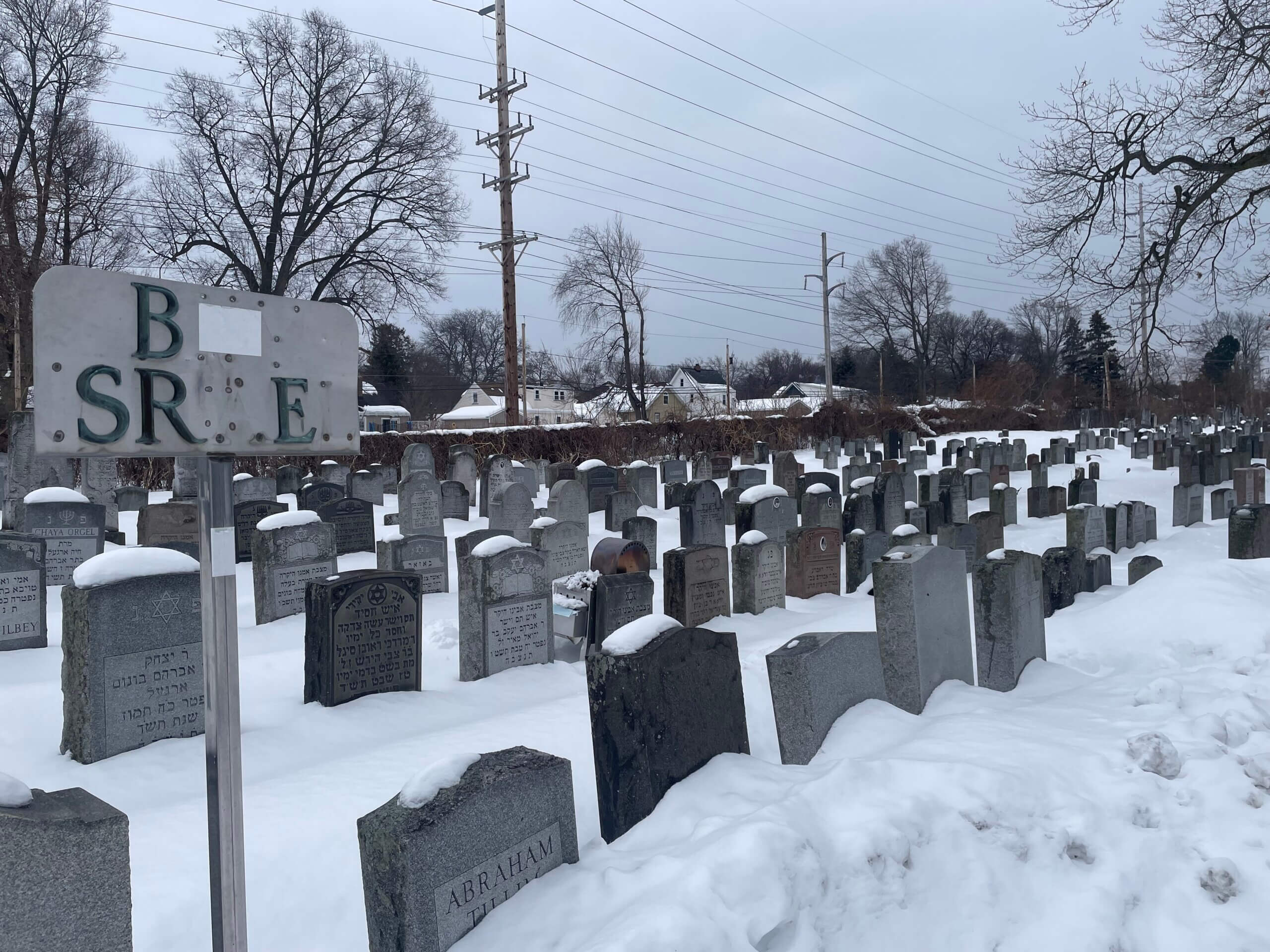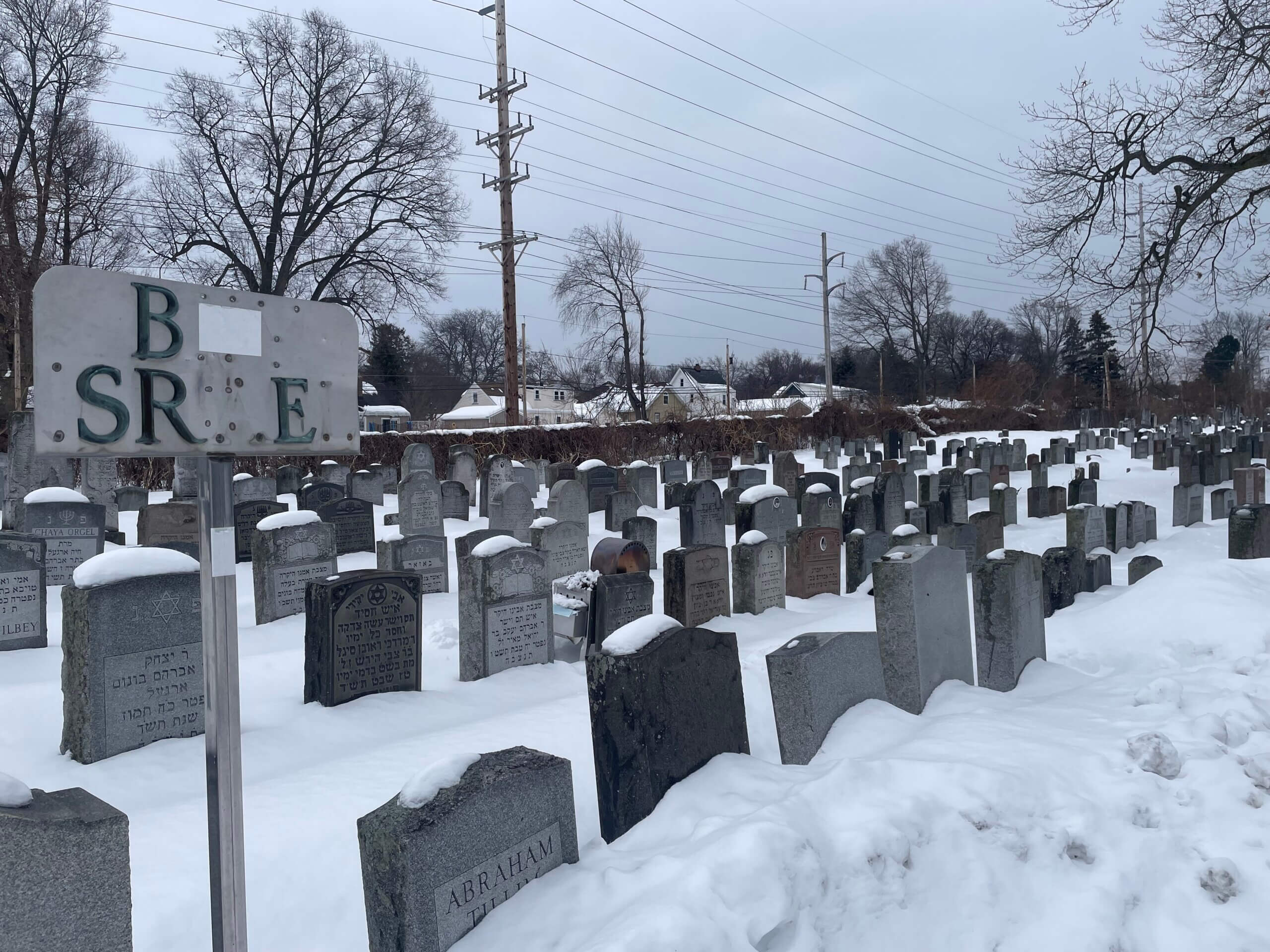Uncategorized
They were denied Jewish weddings in the Soviet Union. So these 3 couples just got married again.
BOSTON (JTA) – Veiled brides holding white bouquets; a gold-colored chuppah; the signing of ketubahs, Jewish marriage contracts; lively Jewish music wafting through a social hall as guests danced the hora.
It had all the telltale signs of a traditional Jewish wedding. But the three couples were already married — and had been for a collective total of 125 years.
The event on Wednesday was an opportunity for three Ukraine-born couples to have the Jewish ceremonies they could not have when they first wed, when Jewish practice was forbidden under communism in their country.
“It was my dream for many, many years and dreams come true,” said Elisheva Furman, who first married her husband Fishel in Ukraine 50 years ago.
Held by Shaloh House, a Chabad Lubavitch organization in Boston that serves Jews from the former Soviet Union, the event was also an opportunity for Chabad rabbinical students to practice officiating at Jewish weddings.
Shaloh House launched a rabbinical training institute in 2021, after Rabbi Shlomo Noginski, an educator at the school, was stabbed eight times outside the building in a vicious attack that jolted Boston and especially its Jewish community.
“This wedding ceremony is a victory of love and kindness over oppression and hate,” said Rabbi Dan Rodkin, director of Shaloh House, in a statement. “It is a testament to the strength of the Jewish people and the resilience of these Soviet-born couples, who want to celebrate their union in accordance with their faith and heritage.”
Rodkin himself grew up in Russia. The Chabad movement, which is especially strong in the former Soviet Union, where it was born, has sought to reach Jews from the region whose practices and connection to Judaism were attenuated by living under communism. Shaloh House offers a school, synagogue and community center all focused on Boston’s substantial community of Russian-speaking emigres.
Growing up, despite antisemitic repression, Elisheva and Fishel Furman both said their families maintained a strong Jewish identity and privately observed Jewish holidays. But “it was dangerous” to show their faith in public, said Elisheva, the grandmother of four. So when they got married, they did so only in a civil ceremony.
A couple prepares to step on a glass, a symbol in Jewish weddings, after their Jewish ceremony in Boston, Feb. 7, 2023. (Photo by Igor Klimov)
Their religious ceremony and the two others that took place Wednesday, individualized for each couple, stretched for more than four hours and featured a festive meal and desserts including traditional Ukrainian and Russian foods.
The event took place in the lead-up to the one-year anniversary on Feb. 24, of Russia’s invasion into the couples’ homeland that is under ruthless bombardment that is devastating Ukraine.
Rimma Linkova, who’s been married to Alexander Linkov for 40 years, and one was of the other couples being married, has a cousin still in Ukraine. They talk regularly, she said.
“It’s almost one year of the war and it’s still not ended. It’s very difficult. It’s dying for no reason.” Linkov said.
The third couple was Sofya Hannah and Gedalia Gulnik, who used their Hebrew names.
Yelena Gulnik said she was thrilled to see her parents have a Jewish wedding, something she said her father was initially hesitant to do after so many years of marriage. The mother of three, whose kids attend Shaloh House’s day school, was born in Odessa and came in 1994 with her parents to Boston when she was 12 years old.
“My parents never had a chuppah, they never had a religious ceremony. They were not familiar with many religious Jewish traditions,” Gulnik said. “But it was an amazing opportunity. I don’t think they would have ever done this if Rabbi Rodkin hadn’t offered.”
Being at a wedding for her grandparents is “a little weird since you don’t see it every day,” Yelena’s oldest daughter said. “But it’s certainly exciting.”
Among the attendees were New England Patriots Jewish owner Robert Kraft, and his wife, Dana Blumberg, who themselves were married in November. Kraft, whose Campaign to Fight Antisemitism philanthropy launched in 2019, made a $250,000 donation following the attack on Noginski that helped start the rabbinic program.
New England Patriots owner Robert Kraft dances at a wedding ceremony for Ukrainian couples who did not have Jewish weddings in their native country, Boston, Feb. 7, 2023. Rabbi Shlomo Noginski is on his left. (Photo by Igor Klimov)
“When I saw Rabbi Noginksi getting stabbed in my hometown of Boston, it hurt me,” Kraft told JTA at the wedding.
“This hit close to home, which was shocking to me,” he elaborated in an email response to a question. “It’s an important reminder that antisemitism and hate happens everywhere, even in a community like ours.”
“Since the attack, I have been moved by how Rabbi Noginski has used this horrible incident as an opportunity to raise awareness of the prevalence of antisemitism and the need to stand up to all acts of hatred,” Kraft wrote. “He is a real hero, who not only saved lives that day, but continues to use his experience to educate others.”
Noginski’s personal story has struck a chord for many. As a young man growing up in St. Petersburg, he and his mother experienced antisemitism, eventually leading them to move to Israel. He and his wife, who at the time of the attack had only recently arrived in Boston, have 12 children.
He has added his voice beyond Boston, speaking in Hebrew at a Washington D.C. rally on antisemitism in July 2021, less than two weeks after the attack. His alleged attacker was arrested but has not yet been tried.
But while the attack was in the background at the wedding event, it was not the main focus as the families celebrated together.
“The wedding has enormous meaning,” said Dmitry Linkov about his parents’ ceremony.
He was 5 when his family left Kyiv and settled in Boston. They lived secular lives when he and his younger sister was growing up, he said, but he and his wife, active in Chabad in Chestnut Hill, now embrace more religious practice and observe Shabbat and keep a kosher home.
“What my parents have done tonight will be passed on for generations. It’s a blessing for our future generations,” Dmitry Linkov told JTA.
He hopes the Jewish wedding ceremony inspires other Jews from the former Soviet Union who fled persecution.
“They are celebrating for a nation,” he said. “It’s pretty amazing.”
Mazels: Tell Us About Your Life Milestones
Have you or a loved one celebrated a Jewish life-cycle event recently? We’re thinking bar/bat mitzvahs, weddings, conversions, and so on. We want to hear about them!
Share some details with us below, and we may reach out for more information.
By filling this out, you acknowledge you agree to JTA’s Privacy Policy: jta.org/privacy-policy
What type of milestone are you sharing?(Required)
—
The post They were denied Jewish weddings in the Soviet Union. So these 3 couples just got married again. appeared first on Jewish Telegraphic Agency.
Uncategorized
Board of Peace Members Have Pledged More Than $5 billion for Gaza, Trump Says

A drone view shows the destruction in a residential neighborhood, after the withdrawal of the Israeli forces from the area, amid a ceasefire between Israel and Hamas in Gaza, in Gaza City, October 21, 2025. Photo: REUTERS/Dawoud Abu Alkas/File Photo
US President Donald Trump said Board of Peace member states will announce at an upcoming meeting on Thursday a pledge of more than $5 billion for reconstruction and humanitarian efforts in Gaza.
In a post on Truth Social on Sunday, Trump wrote that member states have also committed thousands of personnel toward a U.N.-authorized stabilization force and local police in the Palestinian enclave.
The US president said Thursday’s gathering, the first official meeting of the group, will take place at the Donald J. Trump Institute of Peace, which the State Department recently renamed after the president. Delegations from more than 20 countries, including heads of state, are expected to attend.
The board’s creation was endorsed by a United Nations Security Council resolution as part of the Trump administration’s plan to end the war between Israel and Palestinian Islamist group Hamas in Gaza.
Israel and Hamas agreed to the plan last year with a ceasefire officially taking effect in October, although both sides have accused each other repeatedly of violating the ceasefire. According to Gaza’s Health Ministry, more than 590 Palestinians have been killed by Israeli troops in the territory since the ceasefire began. Israel has said four of its soldiers have been killed by Palestinian militants in the same period.
While regional Middle East powers including Turkey, Egypt, Saudi Arabia, Qatar and Israel – as well as emerging nations such as Indonesia – have joined the board, global powers and traditional Western US allies have been more cautious.
Uncategorized
Why a forgotten teacher’s grave became a Jewish pilgrimage site

Along Britton Road in Rochester, New York, a brick gatehouse sits across from ordinary homes. Beyond it lies Britton Road Cemetery, its grounds divided into family plots and sections claimed over time by Orthodox congregations and fraternal associations, past and present. Names like Anshe Polen, Beth Hakneses Hachodosh, B’nai Israel, and various Jewish fraternal organizations are found here.
On the east side of the cemetery, a modest gray headstone draws visitors who do not personally know the man buried there, who were never taught his name in school, and who claim no personal connection to his life. Some leave notes. Some light candles in a small metal box set nearby. Others whisper prayers and stand for a moment before going. They come because they believe holiness can be found here.
The grave belongs to Rabbi Yechiel Meir Burgeman, a Polish-born teacher who died in 1938. He did not lead a major congregation or leave behind an institution that bears his name. And yet, nearly a century after his death, people still visit.
Over time, Burgeman has come to be remembered as a tzaddik nistar, a hidden righteous person, whose holiness is known through their teaching and daily life rather than through any title or position. His grave has become a place of intercession. People come to pray for healing, for help in times of uncertainty, and for the hope of marriage. What endures here is not an individual’s biography so much as a practice: the belief that a life lived with integrity can continue to shape devotion, even after the body has been laid to rest.
In life, Burgeman was not known as a miracle worker or a public figure. He was a melamed, a teacher of children, living plainly among other Jewish immigrants in Rochester’s Jewish center in the early decades of the 20th century. At one point, he was dismissed from a teaching post for refusing to soften his instruction. He later opened his own cheder, or schoolroom. There was no congregation to inherit his name, no institution to archive his papers. When he died, he was buried in an ordinary way at Britton Road Cemetery, one grave among many.
What followed was not immediate.
Remembered in return

The meaning attached to Burgeman’s resting place accumulated slowly. Stories began to circulate. People spoke of his kindness, his discipline, his integrity. Over time, visitors came. The grave became a place not of answers, but of belief. For generations, this turning toward the dead has taken this same form. It is not worship. It is proximity. A way of standing near those believed to have lived rightly, and asking that their merit might still matter.
In Jewish tradition, prayer at a grave is a reflection on those believed to have lived with righteousness, asking that their merit accompany the living in moments of need. Psalms are traditionally recited. Words are often spoken quietly.
I have done something similar too. Years ago, before I converted to Judaism and before I had the means to travel, I sent a written prayer through a Chabad service that delivers letters to the grave of the Lubavitcher Rebbe in New York. Someone else carried it. I cannot say with absolute certainty what happened because of it. Only that the practice itself made space for hope that I was seen, and that a prayer was later answered in ways that shaped my life and deepened my understanding of Judaism.
Burgeman’s grave functions in a similar register, though without any institutional frame. People come not because his name is widely known, but because the story has endured. Over time, that story gathered details. The most persistent involves a dog said to have escorted Jewish children to Burgeman’s cheder so they would not be harassed along the way by other youths. The dog then stood watch until they were ready to return home. The versions differ. Some are reverent. Some are playful. Some verge on the miraculous. The story endures because it names something children needed: care, in a world that could be frightening.
In recent decades, Burgeman’s afterlife has taken on a digital form. His name surfaces in comment threads and genealogical forums, passed along by people who never met him and are not always sure how they are connected. Spellings are debated. Dates are corrected. A descendant appears. A former student’s grandchild adds a fragment. Someone asks whether this is the same man their grandmother spoke of. No single account settles the matter. Instead, memory gathers. What once traveled by word of mouth now moves through hyperlinks.
The internet allows fragments to remain visible. Burgeman’s story survives not because it was officially recorded, but because enough people cared to remember it. In this way, his legacy resembles the man himself: quiet, unadorned, sustained by actions rather than declaration.

This story does not offer certainty. It is about remembering a life and asking if we might still learn from it and if, perhaps, it can bring us closer to faith. Burgeman left no grand monument. He left descendants. A grave. A life of Jewish values that continues to teach.
Burgeman did not seek recognition in life. After death, he became something else: a teacher still teaching, not through words, but through the way people continue to act on his memory. That is the lesson. Not any miracle. Not any legend. The quiet insistence that a life lived with integrity does not end when the casket is placed into the earth.
Some graves are instructions.
This one still asks something of us.
The post Why a forgotten teacher’s grave became a Jewish pilgrimage site appeared first on The Forward.
Uncategorized
Turkey Sends Drilling Ship to Somalia in Major Push for Energy Independence

Turkish President Tayyip Erdogan speaks during a ceremony for the handover of new vehicles to the gendarmerie and police forces in Istanbul, Turkey, Nov. 28, 2025. Photo: REUTERS/Murad Sezer
i24 News – Turkey has dispatched a drilling vessel to Somalia to begin offshore oil exploration, marking what officials describe as a historic step in Ankara’s drive to strengthen energy security and reduce reliance on imports.
Turkish Minister of Energy and Natural Resources Alparslan Bayraktar announced that the drilling ship Çagri Bey is set to sail from the port of Taşucu in southern Turkey, heading toward Somali territorial waters.
The vessel will pass through the Strait of Gibraltar and around the coast of southern Africa before reaching its destination, with drilling operations expected to begin in April or May.
Bayraktar described the mission as a “historic” milestone, saying it reflects Turkey’s long-term strategy to enhance national energy security and move closer to self-sufficiency.
The operation will be protected by the Turkish Naval Forces, which will deploy several naval units to secure both the vessel’s route and the drilling area in the Gulf of Aden and the Arabian Sea. The security arrangements fall under existing cooperation agreements between Ankara and Somalia.
The move aligns with a broader vision promoted by President Recep Tayyip Erdoğan, aimed at reducing Turkey’s dependence on foreign energy supplies, boosting domestic production, and shielding the economy from external pressures.
Bayraktar said Turkey is also working to double its natural gas output in the Black Sea this year, while continuing offshore exploration along its northern coastline. In parallel, Ankara is preparing to bring its first nuclear reactor online at the Akkuyu Nuclear Power Plant, which is expected to begin generating electricity soon and eventually supply about 10% of the country’s energy needs.
The current drilling effort is based on survey data collected last year and forms part of Ankara’s wider plan to expand its energy exploration activities both regionally and internationally.


